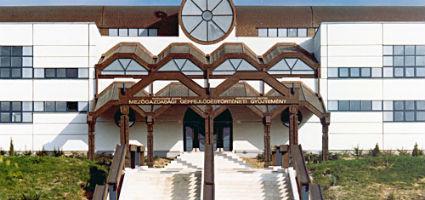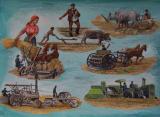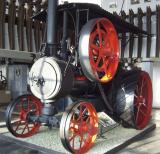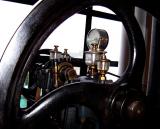2025. July 17. Thursday
St. Stefan University Agricultural Tool and Machine Development Museum - Gödöllő
 |
Address: 2103, Gödöllő Páter Károly utca 1.
Phone number: (28) 410-210, (28) 522-000 /1050
E-mail: muzeum@gepmuzeum.szie.hu
Opening hours: Mon-Fri 9-16, Sat 9-14
|
The Subject Museum of the History of Agricultural Equipment and Machinery was established in 1987. It was the consequence of collection and processing material for three decades.
The Subject Museum proceeds with its professional work at the scientific and professional base of the Mechanical Engineer Faculty of the Saint Stephen University. Its object and task is to tend the values of the history of the development of technique, the formation of technique concerning agriculture. The development is a value of culture and it is important to show it in the framework of one of the most important agricultural institution of the country.
The object of the Subject Museum is to find the old agricultural and forestry machines in the country, collect and process them. They intend to show them to the visitors in operation along with technical solutions of our age.
Its task is the quality, scientifically established wide-range education, and also to help the education of agriculture and participation in the education of engineers. It is also important to show the present and future of agricultural technique and teaching the students the love of profession.
Producing food has been the most vital task of people. It is natural for us to have enough of everything, but it was not the same in the history of mankind.
Agricultural work and the perseverance of life has been a recurring fight of our ancestors. It has been a process of development but the outcome was often independent of men but was influenced by many things; let us just think of the weather. The history of obtaining and producing food goes hand in hand with the development of humankind.
The development of agricultural yield, the agricultural technique, the development of science and technique lead to the present state of 5-12% of humanity can producing enough for all of us. This development facilitated the development of other fields of technique, making the conditions of our existence become better.
The visitors to six of our permanent exhibitions in the Subject Museum may learn about the development of technique that serves to ease the continuous fight of humankind for food.
The Subject Museum proceeds with its professional work at the scientific and professional base of the Mechanical Engineer Faculty of the Saint Stephen University. Its object and task is to tend the values of the history of the development of technique, the formation of technique concerning agriculture. The development is a value of culture and it is important to show it in the framework of one of the most important agricultural institution of the country.
The object of the Subject Museum is to find the old agricultural and forestry machines in the country, collect and process them. They intend to show them to the visitors in operation along with technical solutions of our age.
Its task is the quality, scientifically established wide-range education, and also to help the education of agriculture and participation in the education of engineers. It is also important to show the present and future of agricultural technique and teaching the students the love of profession.
Producing food has been the most vital task of people. It is natural for us to have enough of everything, but it was not the same in the history of mankind.
Agricultural work and the perseverance of life has been a recurring fight of our ancestors. It has been a process of development but the outcome was often independent of men but was influenced by many things; let us just think of the weather. The history of obtaining and producing food goes hand in hand with the development of humankind.
The development of agricultural yield, the agricultural technique, the development of science and technique lead to the present state of 5-12% of humanity can producing enough for all of us. This development facilitated the development of other fields of technique, making the conditions of our existence become better.
The visitors to six of our permanent exhibitions in the Subject Museum may learn about the development of technique that serves to ease the continuous fight of humankind for food.


